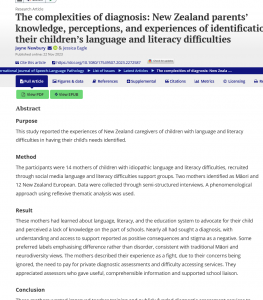NEW NZ RESEARCH
The complexities of diagnosis: New Zealand parents’ knowledge,perceptions, and experiences of identification of their children’s language and literacy difficulties.
By Jayne Newbury and Jesscia Eagle
The DEB community would like to acknowledge and thank Jayne and Jessica for the work they are doing in this space and for providing the information to share with the community. The community would also like to thank the families who took part in the research, many parents will resonate with their journeys . Thank you for your voice and advocacy.
Jessica Eagle and I are both speech language therapists, and I am a researcher at the University of Canterbury. We did this study for the children with dyslexia and developmental language disorder in New Zealand. These children often go unsupported or receive only a small amount of support. However, research showarly ongoing support can make a huge positive difference to how well they do at school and to their lives in general. We wanted to tell parents’ stories about how they got their child’s needs recognised. We hope this study will help highlight the fight many parents face to find help for their child and prompt change in the education system to better support these students.
Jayne Newbury
Brief summary
This study is about how parents of children with language and literacy difficulties found getting help for their child’s learning in New Zealand.
We advertised on social media support groups for dyslexia and developmental language disorder. Fourteen mothers were chosen to talk with us about their journeys with their child. Two mothers were Māori and 12 New Zealand European. We organised their answers into themes to summarise their thoughts.
These mothers knew a lot about language, literacy and education. They had learned a lot to fight for their child. They thought schools and teachers should know more. Nearly all mothers had tried to get a diagnosis for their child. They hoped a diagnosis would give more support and more understanding for their child’s struggles. Some didn’t like the labels “dyslexia” and “developmental language disorder” as these highlighted what their child can’t do and carry stigma. Some wanted labels which were more positive, in line with neurodiversity and Māori views. However, getting support was the main thing. The mothers felt they had to fight for their child’s needs to be met. Some felt their concerns had been ignored. Nearly all paid for private assessments and had trouble finding the right person to test their child. They were happy with assessors who gave them useful information from the tests and who helped them talk with the school about what their child needed.
These mothers wanted teachers to know more about language and literacy difficulties. They wanted assessments to identify their child’s needs to be paid for by the government. Finally, they wanted their child to have teaching which worked for them at school.
The link to the research – The complexities of diagnosis: New Zealand parents’ knowledge, perceptions, and experiences of identification of their children’s language and literacy difficulties
For your convenience we have attached the PDF for easy access – The complexities of diagnosis New Zealand parents knowledge perceptions and experiences of identification of their children s language and literacy difficulties
